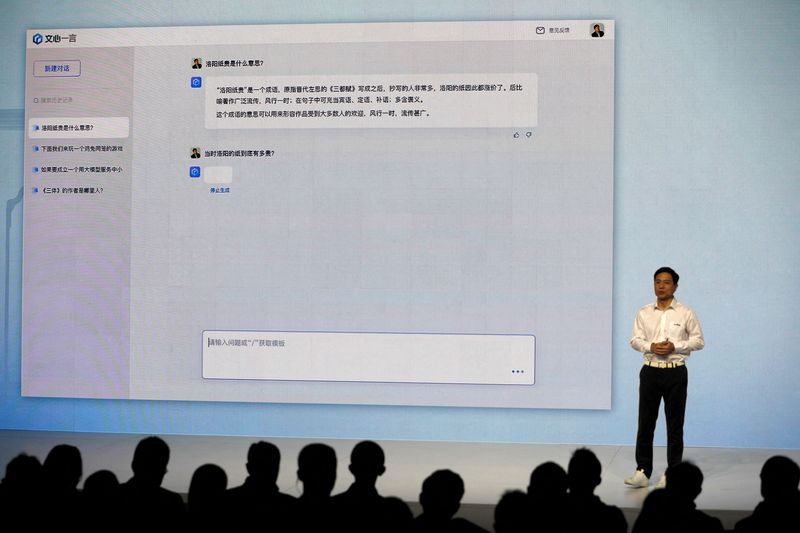By Josh Ye
HONG KONG (Reuters) – China’s craze over generative artificial intelligence has triggered a flurry of product announcements from startups and tech giants on an almost daily basis, but investors are warning a shake out is imminent as cost and profit pressures grow.
The buzz in China, first ignited by the success of OpenAI’s ChatGPT almost a year ago, has given rise to what a senior Tencent executive described this month as “war of a hundred models”, as it and rivals from Baidu to Alibaba to Huawei promote their offerings.
China now has at least 130 large language models (LLMs), accounting for 40% of the global total and just behind the United States’ 50% share, according to brokerage CLSA. Additionally, companies have also announced dozens of “industry-specific LLMs” that link to their core model.
However, investors and analysts say that most were yet to find viable business models, were too similar to each other and were now grappling with surging costs.
Tensions between Beijing and Washington have also weighed on the sector, as U.S. dollar funds invest less in early-stage projects and difficulties obtaining AI chips made by the likes of Nvidia start to bite.
“Only those with the strongest capabilities will survive,” said Esme Pau, head of China internet and digital asset research at Macquarie Group, who expects consolidation and a price war as players compete for users.
She added that several leading companies have signaled they will compete on price to gain market share, just as cloud services such as those belonging to Alibaba and Tencent have done.
“In the next six-12 months, LLMs with lower capacities will gradually be eliminated due to chip restrictions, high costs and intensifying competition,” Pau said.
FOUNDERS AND INCUMBENTS
Opinions on which firms will last vary widely.
Yuan Hongwei, chair of Shenzhen-based venture capital Z&Y Capital, said she believed that only two to three general-purpose LLMs will end up dominating the market.
That is why her firm looks for experienced founders when deciding on which startups to invest in.
Z&Y, whose past investments include drone maker DJI and autonomous driving startup Pony.ai, eventually decided to back Baichuan Intelligence, a five-month-old firm looking to build an open-source AI model to rival Meta Platform’s Llama 2.
Baichuan was started by Wang Xiaochuan, founder of China’s No.2 internet search engine Sogou Inc, and became one of the first five companies to receive Beijing’s approval to release a public chatbot in late August. The company is on track to close a second round that will value it at $1 billion, Wang said.
“We see an opportunity here,” Yuan said. “Wang himself is leading this project. Given his understanding of the digital business, his success with Sogou and how he commands attention industry-wide, we think it is our best bet.”
Several other big name entrepreneurs and tech executives are behind new Chinese AI startups, such as Google China’s former chief Kai-Fu Lee and Yan Juejie, a former vice-president of SenseTime.
Others said that China’s largest tech companies Alibaba, Tencent and Baidu ultimately had the biggest headstart and deep pockets to succeed, given their large user bases and wide range of services. For instance, they could easily offer generative AI services as an additional plug-in to their cloud users.
“The incumbent tech giants have inherited an unfair advantage of a majority of low-hanging fruit business scenarios from their established ecosystems,” said Tony Tung, managing director at Gobi Partners GBA.
Tung added that some investors regret prematurely investing in LLM firms at the peak of the hype earlier this year with many such startups struggling to build strong business cases and now looking to partner with tech giants to find use cases or be potentially sold to them.
“Many people end up developing similar LLMs, that are looking for similar problems to solve, with micro innovation in the data processing technique or model architecture,” he said.
“At this particular moment, investors have certainly sobered up quite a bit compared to early this year.”
(Reporting by Josh Ye, Editing by Brenda Goh and Sam Holmes)
